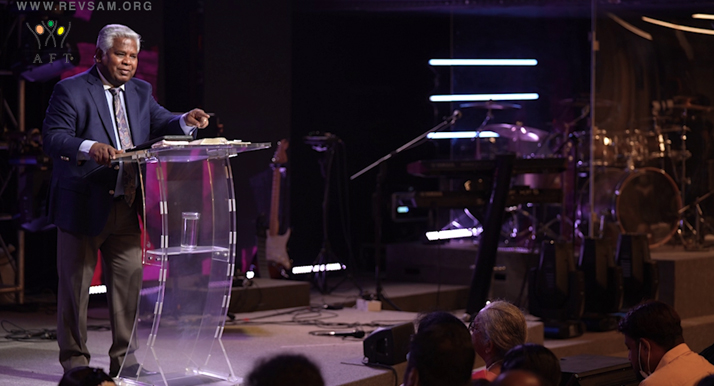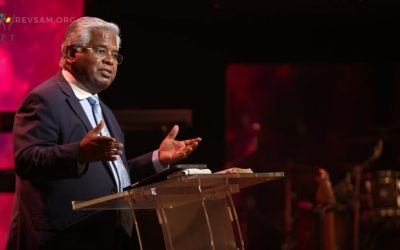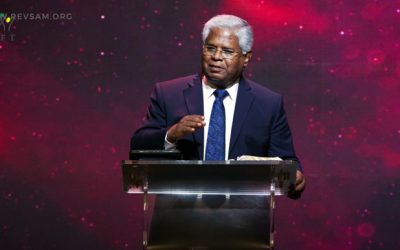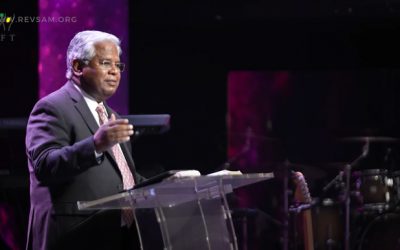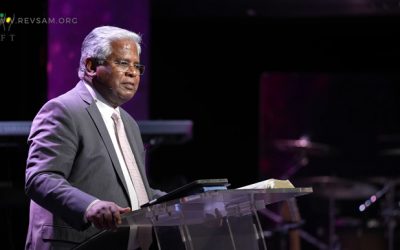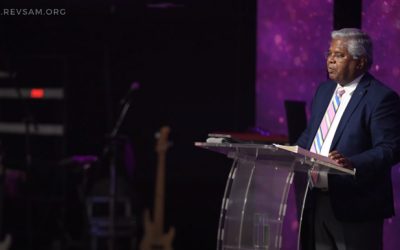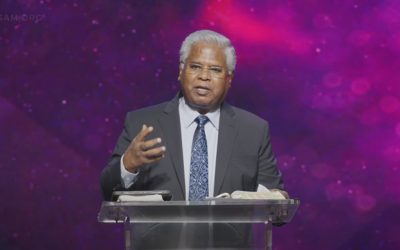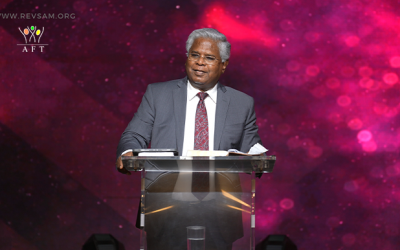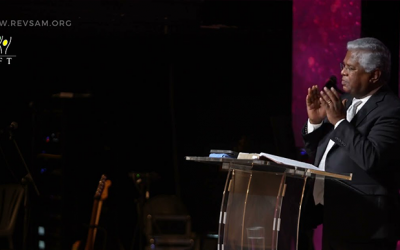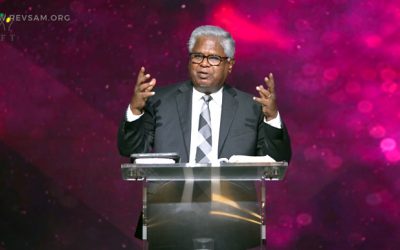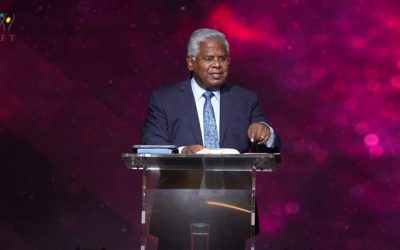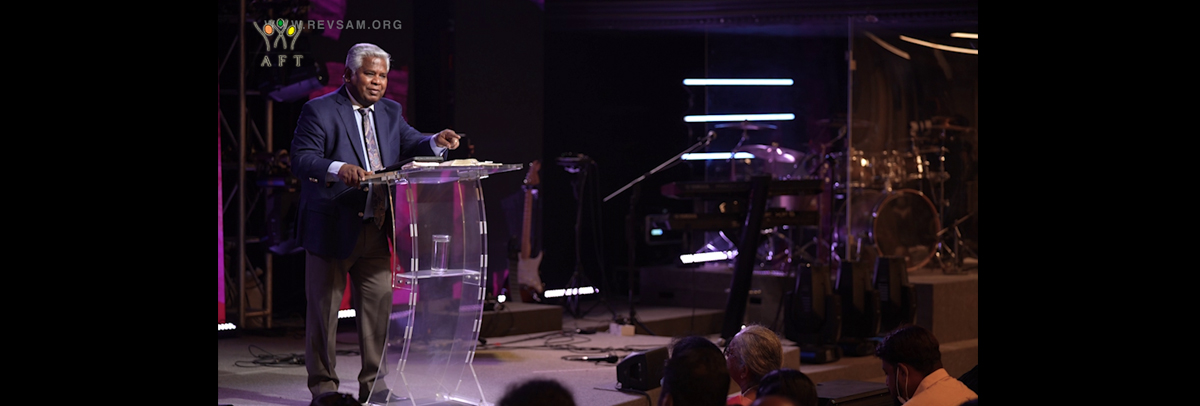
Redeemed from the sickness: Brazen Serpent on the pole
Sunday English Service – 24 APR 22
Transcript
As you know, we are teaching a series called ‘Redeemed’ and on that, we’re talking about how we are redeemed from sickness. Talking about that, we’re looking at various Old Testament portrayals of redemption and showing you that in those portrayals bodily healing is also there, in those types and shadows and portrayals and pictures in the Old Testament that teach about redemption. The whole Bible is the story of redemption. There are various wonderful pictures of redemption given in the Old Testament, and you will find the healing in many of them. And so, we’ve been going through some of these pictures and today we’re going to go through another one.
But let me say this before we get into that: forgiveness of sins or salvation, as we call it, and healing for the body, go together in the Bible. Scripturally, if you look at it, they go together. Why? Because man is not really spiritual in nature but he’s also material. He’s got a body. He’s not just spirit or soul, but he’s got a body and therefore, when he fell into sin, not only was he affected spiritually, but he was also affected bodily, and because of that redemption, when God redeems man, redemption happens in both these areas, spiritually and physically. You cannot say that redemption is only for the spiritual side of it and not for the bodily side of things. That is why you have many scriptures, even the Old Testament talks about bodily healing, in connection with forgiveness of sins. For example, in Psalm 103 that famous verse says, “Bless the Lord, O my soul, And forget not all His benefits” and then it says, “For He forgives all your iniquities and heals all your diseases”. Both these things go together, forgiving all your iniquities and healing all your diseases, both come together. And when Jesus came, He brought the kingdom of God into the world. And the kingdom has been inaugurated because He’s our King. There is an invisible kingdom now. The Bible speaks about us going into the kingdom, seeking the kingdom. And the Bible talks about how the kingdom meets all our needs. “Don’t worry about what you will eat, drink, and be clothed with, for your heavenly Father knows that you have need of these things. Seek first the kingdom of God and His righteousness and all these things shall be added unto you.” So, the kingdom life, and the kingdom teachings are there in the scriptures. And Jesus brought the kingdom, He is the King. And He preached the Good News of the kingdom. That’s the way the Bible puts it. So, the kingdom has come in that way. In the invisible way, there’s an invisible kingdom. And this King rules our hearts and we are from that kingdom. We are like aliens in this world. That’s the way the Bible presents it. And in the coming days, when Jesus comes back again for the second time, there will be the consummation of the kingdom.
Now, the inauguration of the kingdom has happened, consummation of the kingdom, or the fullness of the kingdom will come, where He will literally rule over everyone in the days to come. And at that time, our redemption will also be complete. If you notice the Bible talks about redemption, as something that has happened and something that has yet to happen. A lot of people are confused by it because passages like Ephesians chapter 1, verse 7 says, “We have redemption the forgiveness of sins”. It specifies there, what redemption we have. We have redemption, the forgiveness of sins. We have redemption in one way that is our sins have been forgiven. We don’t now live under the punishment of God. We are children of God now. We were released from the power of sin. We can win our battle against sin. All of that is given now in this kingdom. In this kingdom life we have been forgiven of sins, basically. But we live in a sinful world. We live in a body of sin, the Bible says, a body that dies. In a sinful world we live. In a world where the devil is the god of this world but he’s not our God. Jesus is our Lord.
But we live in this world. But when the kingdom comes and when the consummation of the kingdom happens, in the end when Jesus comes, there you will have no more sin because the devil will not be there and sin will not be there. The world will not be a world of sin. It will be a different world. So, the kingdom coming happens in two ways: now invisibly, since Jesus came, and when He comes again, it’s going to happen in a visible way, in a complete way.
So, today our sins are forgiven, but we live in a sinful world. In the same way, today, our bodies are healed. We’re given health; we’re given even long life. These are promised in the Word of God. Even the long life is promised. Life without death is not promised now; life without death is something that is going to happen at the consummation of the kingdom. So, you’ve got to look at it in two parts. So, the Bible teaches it like that, but always the forgiveness of sin goes along with healing for the bodies.
Now, in Isaiah chapter 33, if you look at the beautiful words there, Isaiah 33, the last verse, I think. There is a wonderful verse there that talks about what will happen when the kingdom fully comes. It says, “And the inhabitant will not say, “I am sick;” the people who dwell in it will be forgiven their iniquity.” Why won’t they say they’re sick? Because they’ll be totally forgiven their iniquity. The inhabitant will not say I’m sick, the people know that dwell in it will be forgiven their iniquity. Now, this kind of thing has already happened, even though it is not happening completely because the consummation of the kingdom has not come, the inauguration of the kingdom has happened. So, when Jesus came, He put the forgiveness of sin and healing for the body together. Remember the paralytic that was lowered through the roof, in a place where Jesus was teaching. Jesus looks at that man, instead of just saying something to heal him from his condition, the paralytic condition, He looks at him and says, “Son, your sins I’ve forgiven you.” Everybody was upset. Jesus could look at them and tell them they’re upset because He said, “Your sins are forgiven.” Because they thought, well, if He heals this man, we can understand that maybe He is a prophet. He’s got a gift of healing or something. He’s doing some miracle; we can get along with that. But how can this Man, being a man say that He forgives sins? God only forgives sins. A man cannot forgive sins. That’s why they were upset. All the Jews were upset. So, Jesus addressed that question. He said, “Oh, you’re upset because I said, your sins I’ve forgiven you. Now I’ll show you that the Son of Man has the power to forgive sins.” I now say to this man, “Take up your bed and walk,” He said. And the man took up his bed and walked. In other words, He’s connecting the forgiveness of sin and healing for the body together. He’s taking up his bed and walking because his sins are forgiven. The fact that his sins are forgiven is something that we can say that his sins are forgiven. You cannot see. How can you see your sin forgiven? The healing shows that his sins are indeed forgiven; He demonstrated it there.
So, you have a lot of instances like that. John the Baptist sends some people to inquire about Jesus and ask Him whether He was the One that is to come, or they should wait for someone else. And the reply of Jesus is like this, “The blind receives their sight. Look at what’s happening around me,” He says. The blind receives their sight. The lame walk, lepers are cleansed and the Gospel is preached. That’s what He says. So, the preaching of the Gospel and healing of the sick. The preaching of the Gospel is not just to bring people to Christ and have the forgiveness of sins. It’s also for the healing of the body; it puts the two together. So, the Bible teaches in this way, that when redemption happens, it does not happen just for the spiritual side of man. Something happens to the material side also because man is spiritual and material. The two things go together. We separate the two; a lot of Christians have not separated the two. They say, well, sin belongs to a spiritual domain. And God is displeased with it, and God has to forgive sins, and that can happen now. But sickness on the contrary is only part of the present condition of our nature. And God doesn’t have anything to do with it. God is not condemning sickness or anything like that. He’s not against the sickness, it looks like. That’s the way they put it. He’s against sin, but not against it, but the Bible doesn’t teach it like that. Some have gone as far as teaching that sickness, when it comes to a person, it must be thought of as a proof of God’s love and the grace of God. It’s a sign of God’s love. Those whom God loves; He chastises. So, they think sickness is a proof of the love and the grace of God, they think, but in the scripture, as well as in all the teachings of Christ, Jesus never speaks of sickness in this way. The Scripture never presents the truth in this way. They always present sickness as something that is against the Will of God. That is something that is destructive. The scriptures and Jesus never present sickness as a blessing, or as a proof of God’s love, which should be borne with patience.
Jesus told His disciples that there will be diverse kinds of suffering, that they will have to undergo because of the Gospel. Persecution, they’ll not undergo, and we agree with that. But He never said sickness is one of the things that they have to undergo. He never said that. He even said that everyone has to bear their cross, but He never mentioned that sickness is one of the cross. So, sin in the soul and sickness in the body, both were witness to the power of Satan. And the Son of God was manifested, that He might destroy the works of the devil that has brought sin and sickness, sin and death, and the starting point of death is sickness. So, this is the whole point that we’re trying to make. And you need to see that in all the portrayals that we have in the Old Testament, as well as in all the teachings concerning healing and redemption, bodily healing, and redemption.
So, let’s go to Numbers, chapter 21. Now, let’s look at it because now you can look at it in context and appreciate what we’re going to say right now, from Numbers 21, verse 4 to 9. Here we have a wonderful portrayal of redemption. Already God has planned redemption. He knows how He is going to redeem and what redemption is going to be like. Therefore, from the very first pages of the Bible, God began to reveal from the beginning of human history, God began to reveal the story of His redemption, because He knew how redemption is going to happen. He has prepared the Lamb, the Lamb that was slain before the foundation of the world. He has prepared a plan of redemption; therefore, He is able to speak about it from the beginning of human history. So, right now, we have this picture here in verse 4. I’ll read from 4 to 9: “Then they journeyed from Mount Hor by the Way of the Red Sea, to go around the land of Edom; and the soul of the people became very discouraged on the way. And the people spoke against God and against Moses: “Why have you brought us up out of Egypt to die in the wilderness? For there is no food and no water, and our soul loathes this worthless bread.” So, the Lord sent fiery serpents among the people, and they bit the people; and many of the people of Israel died.
Therefore, the people came to Moses, and said, “We have sinned, for we have spoken against the Lord and against you; pray to the Lord that He take away the serpents from us.” So, Moses prayed for the people.
Then the Lord said to Moses, “Make a fiery serpent, and set it on a pole; and it shall be that everyone who is bitten, when he looks at it, shall live.” So, Moses made a bronze serpent, and put it on a pole; and so, it was, if a serpent had bitten anyone, when he looked at the bronze serpent, he lived.”
Now, let me give you some background, the background about the book of Numbers itself. The book of Numbers is about the people of Israel, as they came out of Egypt, the first generation, remember? They went at the edge of Canaan, in chapter 13, in Numbers, they go to the very edge of Canaan. They’ve arrived, they have to just take a step and go in and possess the land. God said, “I’ve given you the land,” but they refused to go because the toll spies went, 10 of them brought an evil report and said there are giants in the land, we’ll never be able to possess it. Let’s not go there because they will eat us up, we’re like grasshoppers. We cannot do it. But God said, “I’ve given it to you.” They never said God has given it to us; they never believed it. They refused to go in, they scared the people by the evil report and all the people cried. In the 14th chapter of Numbers, you read, all those people who cried and wept. They were vexed that they could not go into the Promised Land. They could not believe that God has given them the land and a good life. They came to the very edge of that land and they refused to go.
So, God said, “Well, because of your unbelief, you don’t want to go. So, Joshua and Caleb, these two guys out of the 12 that went as spies, they gave a good report. They said, “We can go right now, very easily we can possess the land” but nobody was willing to believe them. They believed the majority of the 10. So, God said “Well, because you did this, this generation is going to die in the wilderness. Everybody above 20 years of age, you will die here in the wilderness. You will never see the Promised Land. You’ll die in the wilderness. The next generation, those who are under 20 now and those who will be born hereafter, they will enter into the Promised Land”, God said.
So, when you come to the 21st chapter, in the 20th chapter, the first generation dies off. We have the story of Miriam, Moses’s sister and Aaron dying there in the 20th chapter. So, you can imagine the first generation is gone. They’re all dead. Not all of them are dead because until the 26th chapter, you read about some of them, they’re there, but almost all of them are gone. The remnants are left; the second generation is now coming into the picture. So, there is a transition from the first generation to the second generation. Now, the second generation, how are they going to behave? What are they going to be like? Are they going to be like their parents or are they going to be different? And many times, raising our children, you know, sometimes you wonder where they get everything from. Why are they like this but we have to look at ourselves in the mirror. Then you will find out, they got it from us; a lot of things they got from us. That’s why we’ve got to be careful, when you raise them because they get all these different qualities through the parents.
Moses was raised by his mother. Pharaoh’s daughter found Moses as a child and wanted to raise the child and somehow, by divine ordination, Moses’s mother got hired to raise the child for her, raise him up for her, as a maid. And Moses’s mother was a woman of faith. And so, the Bible says, “By faith, when Moses became old enough, he refused to be called the son of Pharaoh’s daughter and chose rather to suffer affliction with the people of God.” What a choice he makes. He refuses to be called the son of Pharaoh’s daughter, refuses to be called the grandson of Pharaoh because his mother has not only been feeding him and taking care of him and cleaning him up and all that. She was all the time telling him, “Look, you’re not Pharaoh’s grandson. Don’t you ever think like that. You’re something bigger. You are Abraham’s grandson. Abraham is a man who believed in the God who’s the possessor of heaven and earth. He’s a blessed man. He’s got a covenant with God. So, don’t you think that this Pharaoh is bigger than our God. Our God is much bigger than Pharaoh and you are a child of God. You’re in a covenant with God; you’re a covenant man. You’re Abraham’s son.” She had been teaching him that, so when he grew up, got old enough to make his choices, he chooses rather to suffer affliction with the people of God even if you have to, rather than to enjoy the pleasures of sin in Egypt, the Bible says. Nice mother. Mother taught faith. Because the mother taught faith, the child chooses the right thing, makes the right choice.
But here, you see the people of Israel the first generation who died, didn’t have faith. There were people who doubted, people who are rebellious, hard-hearted, murmuring kind of people, always complaining, never satisfied, never believing, always unbelieving. They grew up in that kind of upbringing. And here, the second generation shows all those qualities because you read the 4th verse itself. It says at the end of the 4th verse “The soul of the people became very discouraged on the way”. How many times the parents got discouraged? They got discouraged for so many things and you will find these people, the second generation, getting discouraged and murmuring and complaining just like the parents. They learnt it from the parents. They got very discouraged. The way you handle life’s problems, is the way that your kids are going to look at life’s problems. When you show faith in the time of your struggles, in the time of your problems, your children are going to learn how to stand in faith, in the time of the problem. When you show that you need to go to God and pray about things and commit things to God and not worry and stand in faith, the children also will follow that. It didn’t happen, you see.
So, these people have learned complaining behaviour. They’ve learned to be discouraged. They’ve learned to be downhearted. They’ve learned to be discouraged. So, here they are discouraged. And then, in verse 5, you’ll see that they’re complaining. They spoke against God and against Moses, just like the parents. And look at what they say they say exactly the same words the parents had. I don’t have the time to go back and read their parents history is there. You can read it for yourself. They say exactly what the parents said. They said, “Why have you brought us up out of Egypt to die in the wilderness?” The parents said that, at least two-three times, if you read the previous chapters. Why have you brought us up to this wilderness? Did you bring us up here to die? Don’t do you think there are no graveyards in Egypt? That’s what they said, Oh, these kids were standing and listening and seeing what the parents were saying and they learned exactly those words. And when they grew up, now they’re talking. They’re talking exactly what the parents said. Why have you brought us up out of Egypt to die in the wilderness? That’s how they died. They died in the wilderness, perished in the wilderness because they said, “You brought us up to die. You brought us out to die here in the wilderness,” complaining all the time. Faithlessness, unbelief was coming out of their mouth.
Secondly, they’re complaining, saying, “There is no food and no water and our soul loathes this worthless bread.” They complain about the food and water. It’s not that they didn’t have food. Every day God provided food. The manna but every day, if you ate manna, you’re going to loathe it. There’s a lot of Christians who are saying, “Lord, give us the manna.” But I want to tell you, I want to disappoint you today. God’s will is not manna. If God gave you manna every day, you’d loathe it. God’s Will is that you eat mutton today, chicken tomorrow, fish the next day. Whatever you want the next day. They believed a lot of things. Whatever your heart likes, God wants you to eat. He doesn’t want you to eat the same thing every day. It was an arrangement that God had, the wilderness journey was supposed to be only for 11 days. Ordinary people just walking through the wilderness to get to the place where these people are trying to get. It should take no more than 11 days. But they walked in the same place for 40 years, going round and round and round and round for 40 years, complaining like this because of their unbelief. They were supposed to eat manna only for 11 days. It was an arrangement for a short period, which was to teach them that God is the supplier of their need. God took them through the wilderness because they need to realize there’s no shop to buy, even if they had the money. They had the money but no shop to buy. There is nothing they can get from anybody else there on the way. They have to look up to God. God has to provide. God wanted them to realize that He is the one that supplies them all their needs. God’s Will is not wilderness life for them. God’s Will is the land of Canaan, a large and vast land, flowing with milk and honey. That’s God’s Will. Only 11 days journey. But they, because of their unbelief, made it 40 years. In the same place, they’re going around and around, because of complaining like this. God gave food, manna was given to unbelieving, rebellious people, who kept on murmuring. In spite of all the murmuring and rebellion, God gave them food. God’s grace.
So, people who receive manna are not great believers. They’re unbelievers, people who never believed, people always complained, people who were always murmuring, people who always displeased God. God gives them manna. Okay, have manna. Don’t die. Eat this; this is nutritious food. It must have been nutritious because it sustained them, not one person was weak among them. God gave manna and they were never thankful for it. They complained because there was no meat. Looks like they’re fewer non-vegetarians, they think. They said, what happened to the mutton? What happened to the chicken? We had such good curry there in Egypt and now, there’s nothing. We’re eating manna. This is how they complained. And then when they wanted meat, God even provided meat, you know. Till they got up to their neck you know, they ate and ate and ate until they can throw up, God gave them meat. And then when they ate that, they said where is water, there’s no water. They’ll complain about something; they’re never satisfied about anything, that’s their nature. So, they complained about food, they complained about water. They loathed this food, the Bible says. Loathed this food. So “the Lord sent fiery serpents,” verse 6 says. “Among the people and they bit the people and many of the people of Israel died.”
Now, verse 7, “Therefore the people came to Moses, and said, “We have sinned, for we have spoken against the Lord and against you; pray to the Lord that He take away the serpents from us.” So, Moses prayed for the people.” Now, look at the remedy. The remedy is given in verse 8 and 9. It’s a very interesting remedy and this remedy that God gave is not some random phenomenon. It’s not that God said, which way can I punish them now? I do need to find some new way to punish these guys. Let’s send some snakes, fiery serpents, that I’ve never done before. Let me send this time that kind of punishment. No, it’s not like that. God put a lot of thought into it and designed the punishment and the remedy in such a way that He could use it to teach redemption to them. This is the most amazing thing about it. It was a planned thing, not a random phenomenon. It was an extremely intricately planned thing that God did. The punishment and the redemption were to speak about redemption and reveal some great truths about redemption. We know the punishment the fiery serpents that came in bit the people, the people died. What is the remedy? Verse 8 says “Then the Lord said to Moses, “Make a fiery serpent, and set it on a pole; and it shall be that everyone who is bitten, when he looks at it, shall live.” So, Moses made a bronze serpent, and put it on a pole; and so, it was, if a serpent had bitten anyone, when he looked at the bronze serpent, he lived. So, He says, “Make a bronze serpent; put it on a pole.” Not a live serpent but just a thing made out of bronze, put it on a pole. And everyone that is bitten by the fiery serpent, looks upon it, the pole lifted up before the people with the serpent on it. They’ll be healed. This is the remedy. What kind of remedy is that? Anybody that looks at it will think it’s funny. But that remedy has such great meaning and implications and rich truth that today, this has become the medical emblem. Did you know that? The cross with the serpent. I guess, they don’t know it’s from the Bible. Don’t tell them. They may take it off. All over the world, in all the medical stuff, this is the emblem – the cross with the serpent. They are trying to say what the Bible says about bodily healing. They’re giving us the truth about bodily healing that the Bible teaches. So, that emblem, that remedy is not something ordinary. It’s an intricately planned, beautifully presented picture of redemption.
Now why do I say that? Because these people came out of Egypt and it’s been only 40 years since they came out of Egypt. Chapter 21 is 40 years after they left Egypt. Alright. It’s been 40 years since they came out of Egypt. Before that, for 430 years, so many generations they spent in Egypt, so they become practically, culturally, Egyptians. Culturally, they’re very Egyptian in their thinking and understanding and so on. They know Egypt’s culture, Egypt’s thinking, and Egypt’s symbolisms, and so on. So, there is rich symbolism here presented to them based on that. What kind of symbolism? Why the serpent? See, the serpent was a symbol of power and sovereignty in ancient Egypt. It’s a symbol of power and sovereignty. An image of a cobra was set on Pharaoh’s crown, they say. His crown had an image of a cobra set on it, signifying the power and sovereignty of Egypt. So, it’s symbolism there, rich symbolism. Not only that, but these people also understood that I’m sure they understood that because they know very well what that symbolism means, the serpent meant. It’s the power of Egypt. It symbolizes the power of Egypt and the sovereignty of Egypt.
Secondly, they were Israelites, so, they know biblical history. The story of Adam and Eve and how they fell into sin. So, they know that serpent represented the enemy of mankind, Satan himself. Satan came into the Garden of Eden, spoke to Eve, and used the serpent to come and present themselves to Eve and spoke through the serpent. The serpent was the vehicle through which he came and presented himself and so, the serpent became cursed. And they know all that story. So, they know that the serpent is a symbol of the ultimate enemy of mankind that is Satan himself, who deceived them. So, what was God doing when he said make a brazen serpent and put it on a pole? Why is a pole? The pole also had a symbolism, they say. The pole on which the serpent was to be transfixed was not merely a convenient way of lifting up the serpent where everyone could see. It’s not just a matter of just lifting up this serpent, you need something so the pole was used. No, it was used in a very planned manner. The pole represented the symbol of Egypt’s deity’s power or Egypt’s gods and their power. That is what the pole represented. So, the transfixed serpent on the pole demonstrated, in visual terms, the defeat of Israel’s enemies, Egypt and Satan, overcome by the power of the Lord.
Now, let me back up a little bit. God said put the brazen serpent on a pole and lift it up. Alright. Let’s stay right there and talk about this. Put the brazen serpent on the pole and lift it up. What would it have represented? This pole represented the power of the Egyptian deities. The serpent on the pole represented the power and authority and sovereignty of Egypt. This is what they were living under so long. This is what they suffered under for so many generations as slaves in Egypt, under the hard handedness of the Egyptians, where they became poor and had nothing and they were slaves, worked, they were beaten and they were tortured, if didn’t work. The representation is about all those things, and as well as the serpent represented the deceiver who came to Eve and deceived Eve and then as a result, Adam also sinned. So, when the people looked up at the brazen serpent on a pole, they’re looking at Egypt, they’re looking at Egypt’s authority, they’re looking at Egypt’s deities, they’re looking at the devil who came to the Garden of Eden and deceived Eve, they’re looking at all these things that landed them in trouble. It was because the devil presented himself as the form of a serpent and deceived Eve, Adam was also taken in and as a result, death came in. God said if you eat the tree that is forbidden, the day that you will eat it, you will surely die. Death had set in immediately. Sickness is incipient death; it’s the starting point of death. It set in immediately. He didn’t die the same minute but death was found in his body. The body has become a body of sin, body of death, a body that could die. And the pole with a serpent was lifted up, it reminded them surely of that it also reminded them, it may have looked to them like God saying, “Do you want to come in under its power again? All these 400 years you’ve lived under this power, you have suffered under this power, you were crushed under this power as a slave, you were dominated as a slave under this. Do you want to come under this pole? You’re not dying today because I killed you. You’re dying today because you sinned, just like your forefather brought in death upon all humanity by sinning in the garden. You, by your sin, has brought death to yourself, today. I’m not killing you. You by your disobedience have invited. You have invited the devil into your life. You opened the door for the devil to come in and kill you. You have rebelled and sinned and therefore the door is open now for Satan to come in and bring in sin and therefore bringing death also through sin. This is what it represented when it was lifted up to them. All right.
But then, the next line is very important. He not only said make a brazen serpent, put it on a pole and lift it up. He said that everyone who’s bitten when he looks at this brazen serpent lifted up, he will live. Now this they would have had difficulty understanding. They would have seen the pole of the serpent. They would have been reminded of Egyptian domination, their gods, their deities and their power and their authority, their dominance, their sovereignty, and how they lived under them, crushed under their power and so on. They would have been reminded of the Garden of Eden and Eve and her deception that happened there. They would have been reminded of all those things, they would have realized that they’re dying because of this, that they have sinned. The devil is dominating them, crushing them, they would have realized that but when He said that everyone who was bitten, when he looks at it, shall live. That would have been difficult to understand. Because if the pole represented the deities of Egypt and the serpent represented the power and sovereignty of Egypt, and the serpent also represented Satan, who initially deceived Eve and landed Adam and Eve into sin and death, if this is what it represented, then they would have had difficulty to understand why, if someone who looks at it, will live. You can look at it and understand. Well, it’s not God who’s killing me, it’s my sin. I’ve rebelled, that’s why I’m sinning. You can understand that. You can look at it and be reminded of your past, how you were crushed under Egypt’s domination and so on. The power and authority of Egypt and their gods and so on. You can be reminded of all that, you can be reminded of Satan in the Garden of Eden, all of that you can be reminded of. What sense would you make of this line where it says that everyone who’s bitten, when he looks at it shall live? That is something that won’t make any sense.
For that, we have to go John’s Gospel, chapter 3. Now, you’re going to understand it. John’s Gospel, chapter 3. And in there, Jesus is talking to Nicodemus, you remember that? That Jesus was talking to Nicodemus who came to Jesus by night, didn’t want to come when everybody can see. He comes secretly to Jesus. He’s interested in what Jesus is doing. And Nicodemus was a teacher of the Jews. He was a very knowledgeable person and Jesus tells him, “You must be born again. Unless you’re born again, you cannot enter the kingdom of God.” And that guy could not understand what Jesus was saying. He says, I’m 50 years old, you say I must be born again. How can I go back into my mother’s womb and be born again? It’s difficult. He’s looking at it very naturally. He doesn’t understand the concept. So, Jesus is explaining to him what He’s talking about. He gives two, three different explanations. And then, finally, He decides to give an explanation from the Old Testament because this guy is an expert on the Old Testament. He’s an Old Testament teacher. So, He picks up the portrayal of redemption from Numbers 21. Jesus talking here to Nicodemus, gives this illustration to help him understand what born again means. Amazing. Look at this. Jesus says, “As Moses lifted up the serpent in the wilderness even so must the Son of Man be lifted up. As Moses lifted up the serpent in the wilderness, the Son of Man must be lifted up that whoever believes in Him shall not perish but have everlasting life. For God so loved the world that He gave His only begotten Son that whosoever believes in Him shall not perish but have everlasting life.” The famous verse comes in this context.
Just like Moses lifted up the serpent and people looked at it and lived, the Son of Man must be lifted up. That is, “I must be lifted up,” He says, “So that whoever believes in Him should not perish but have eternal life.” Just like when Moses lifted up the serpent, those who looked on it, didn’t die, but lived. The Son of Man must be lifted up, so that those who look upon Him shall not perish but live. Amazing truth. He connects that story, particularly. Look at the way Jesus is thinking about Numbers 21, about the brazen serpent on the pole. If you ask Jesus, what does that mean? He will say, it means that the Son of Man will be lifted up. Do you mean that the pole then is the Cross and the One that is placed on the cross, the brazen serpent is Jesus? Jesus would say yes. It’s astounding.
When the cross actually happened, people would have thought, look at this Man, and they said it. He said He’s the son of God. He said He came from heaven let God deliver Him. Let His Father come down and deliver Him and no deliverance happened and He died there, in shame, beaten from head to toe, bathed in blood from head to toe, died a horrible death on the Cross. Everybody looked at Him, even the disciples went and shut themselves in a room, scared that they were going to hanged next. They couldn’t understand. They thought it was finished. This Man we had such an expectation that He will be the Messiah. He will do great things. But look, He died a shameful death on the Cross. And I talked about the Cross and the death on the Cross, how shameful it is, what people thought about it, on Good Friday. So, people must have looked at the Cross and thought of it as a shameful thing. And that it was the powers of this world, the power of the devil actually slamming Jesus and killing Jesus on the Cross. That’s the way they would have thought about it. Hell, and devil, Satan himself would have looked at it and thought about it like this. This is the guy who was driving us crazy. He will come and whenever He comes, we will have to run. He drives devils out; He casts devils out. He’s the One that has been troubling us in our work. And now, finally we got Him. Finally, we nailed Him to the Cross and completely killed Him, put Him to shame. What great victory we have! They should have thought and gave up His ghost there and died. But on the third day, God raised Him from the dead. And the Bible talks about it, I don’t have the time to go into all of those things. But Peter preaches about it, he says that death could not hold Him. Hell could not hold Him. He says that His spirit actually went down into hell, the abode of Satan and Satan and all his hosts could not hold Him down there, hold His spirit there. Why?
Because there was no sin in Him. It was not because of His sin He died. He died because of our sin. He died as our substitute. They thought they’d killed the Son of God. They thought they’d killed this Man who presented a lot of threat to them. They thought they had victory and He had defeat. But now on the third day, when God raised Him from the dead, something happened. There was a rumbling happening in Hell itself. The Bible says in Colossians chapter 2 and verse 15. Paul puts it in a beautiful way. He says in Colossians 2:15. He says, “Having disarmed principalities and powers”—that means having stripped the devil and his hosts of all power, disarmed the principalities in power. He made a public spectacle of them. That means, He not only disarmed the devil and his hosts, but He also made a public spectacle of them. That is, He displayed their defeat, their shame, in hell. He made a public spectacle of them triumphing over them in it. “In it,” means the Cross. In the Tamil translation it comes [Tamil 48:08] that means triumphing over them in the Cross. That’s how He rose again. That’s how the picture of resurrection is given. So, devil and his hosts started this was their great victory, victorious moment and they were celebrating. But on the third day, when God looked upon Him, God, who turned His face away from Him because He became cursed for our sakes, now turned his face toward him. And He called Him out of that dead condition. And He came out, He came out spoiling principalities and powers, triumphing over them, making a public display of them. Victorious over the forces of hell and Satan. Taking the keys of hell and Hades. He comes out and triumphs over them on the Cross of Calvary. This is how the Resurrection happens.
Now, when God told Moses to put the brazen serpent on a pole lift it up, I said they will have understood some symbolism about what it all meant. The pole meant this and serpent meant this and so on, in Egyptian terms as well as in Israeli ways. But when He said, “When someone is bitten when they look upon it, they shall live.” They will not have understood it much. But God says that is where the answer is. That is where your healing is. That is how you’re going to live. He says, “I say to you look upon it, and you will live.” They do not fully understand all of that at that time. But I’ll tell you, Jesus gives the interpretation. Jesus tells us about all of that. Jesus was lifted upon the Cross. Can you imagine Jesus as the brazen serpent? Why Jesus as that brazen serpent because He carried our curse, our sin, our sickness, became like us because the human race has come under curse. Since the sin of Adam, the human race has been under curse. And now, Jesus bore the entire sin of the human race and the curse that belonged to the human race upon Himself. He became the cursed One, like the cursed serpent on the cross. The pole, the Cross, which represented in Egyptian terms, it represented the power of the deities of Egypt, now has become the power of God, a symbol of the power of God through the Cross and what has happened there. God completely destroyed the works of Satan so that 1 John, chapter 3, verse 8 says that He came to destroy the works of the evil one, that Paul became the symbol of God’s authority and God’s power. It was not Egypt’s deities and their power. Now God has taken over with His power and authority. Using the crucifixion as a means, He has completely destroyed the works of the evil one, broke the chains of slavery and sin. He bore the sins and the sicknesses, so that people can be set free. This is the picture.
Now, look at what it means to look at it. When He looks at it, shall live. That word “looking” is not ordinary. What is looking mean? Looking means to be occupied and influenced with what we’re looking at. For example, Romans, chapter 4, verse 19. Talks about Abraham, God promised him that He will give him a child but he was almost 100 years old and didn’t have a child. At that time, it says that he did not consider his body which is now dead. Everybody’s saying man, you’re just about dead you’re 100-year-old man, you’re just about dead. He did not consider his body now dead. That is, he did not consider his age, that he has aged so much. That people will say that his body is as good as dead as a big thing, as a big problem. He did not consider his body. What did he consider then? He considered only what God has said. God said you will have a child, doesn’t matter what age. You will have a child and I think every fibre of his being would have said look at your body man, you’re too old. But God said you will have a child, so he chose not to consider the body. But consider what God has said. He was occupied and influenced with this promise that God had given, that God would give him a child.
Looking also means attention. In Exodus chapter 15, we talked about the waters of Mara made sweet by the trees thrown into it. We talked about the Cross there also, at the end of that story, after the bitter waters were made sweet, God made a statute and an ordinance for them. It says in verse 25. What is the statute in the ordinance? We see ordinances made in parliament and so on. It’s a law that is passed, basically. So, God was basically passing a law. What was the law? Verse 26 says, “If you diligently heed the voice of the Lord your God and do what is right in His sight, give ear to His commandments and keep all His statutes, I will put none of the diseases on you which I have brought on the Egyptians. For I am the Lord who heals you.” The ordinance, the law is this, that from today, God says, “I’m going to be your Healer. I’m going to be your Healer but I want you to do something. There’s something that you must do.” Now, this part about how diligently the Commandments must be kept and so on. The Old Testament times, nobody could keep the Commandments because everybody was a sinner; they were not able to keep the commandments. The Commandments were not given so that people can keep it and say to God, I’ve kept all the commandments. It was given to show people that they can’t keep it and they need God to save them. So, when God saved us, how did He save us? He didn’t save us because we kept the 10 Commandments. He saved us because He took our place, became our representative. On our behalf, He kept the 10 Commandments and today, when God looks at us, He sees us in Christ, as people that have fulfilled the 10 commandments, but then it says, not only that, “You have to heed to the voice of the Lord your God.” And it says, “Give ear to His commandments.” It means pay attention, heed, give ear – important words. Listen, heed, give ear, pay attention, it says and if you do that, I’ll be your Healer. Give ear, give attention, then I will be your Healer.
In Mark chapter 4, verse 24, Mark talks about how the Word of God is a seed and it must go into our hearts and produce results and that’s what spiritual life is all about. The Word goes into the heart, which is the soil and produces whatever the Word says. So, healing words must go in and be planted in our hearts to produce healing and whatever else we need. Verse 24, he says in that connection, “Take heed what you hear.” Now, listen; it will make sense. “Take heed what you hear.” You need to, “Take heed what you hear. With the same measure you use, it will be measured to you.” What does it mean? Look at the next line, you will understand. “And to you who hear, more will be given.” In other words, he’s saying, “The measure with which you hear and pay attention, pay close attention, which is the measure of your receiving will be.” The measure of your hearing and attention to God’s Word will determine the measure of how much you will receive. Now, we can understand why everybody doesn’t receive the same measure. The measure of your attention to the Word of God, you heeding to the Word of God, giving your ear to the voice of God, hearing the Word of God, keeping your attention on the Word – how much attention you’ll pay to that in that way, is going to determine how much you’re going to receive. So, all those who want healing, in other words, we need to pay a lot of attention to God’s Word, not be meditating on our sickness all the time. Not meditating upon what the sickness can do, the power of sickness. We should be meditating upon what Jesus has done. We should be meditating upon the Cross, upon what happened there. What Jesus has done, what the Word of God says.
In Jonah, there is a wonderful passage. I don’t know if you noticed that. In Jonah, chapter 2, where Jonah is in the belly of the whale or the fish and there he is, praying. Can you imagine that? I think people will pray very earnestly if they are in the belly of the fish and he prays and look at the way he prays. Chapter 2. And it begins with Jonah prayed to the Lord his God from the fish’s belly and he said: “I cried out to the Lord because of my affliction.” Well, I can like and understand how well he would have cried out. Praying from the belly of the fish, you’ll be crying out. I can understand. And he says “The Lord heard me and answered me. Out of the belly of Sheol l cried, and You heard my voice. He’s got such weight, that even though he’s in the belly of the fish, he has been disobedient, now he’s repenting. He’s crying out to God and look at what he says. Come down to verse 8; I don’t have time to read all of that. Come down to verse 8, he says, “Those who regard worthless idols, forsake their own Mercy. But I will sacrifice to You with the voice of thanksgiving; I will pay what I have vowed. Salvation is of the Lord.” Here, my translation says, “those who regard worthless idols,” but there are many other translations. You will say, “those who regarded lying vanities.” Those who regard lying vanities, forsake their own mercy. In other words, he’s saying, if you believe your situations, and you keep your attention on the situations, he says those are lying vanities. Your situation is a lying vanity. There is only one truth and the truth is God’s word. Those who pay attention to lying vanities, they forsake their own mercy. But he says, “I’m going to sacrifice to you, Lord, with the voice of thanksgiving; I’ll pay what I have vowed”—I vow to you; I’m going to pay it—“Salvation is of the Lord.” He is expecting to go and make a sacrifice, pay his vow, and do things. He’s expecting to come out of the fish’s belly, and he did. That’s paying attention. Looking also means expectation.
In Isaiah 45:22, we read. Isaiah speaks on behalf of God, he’s God’s voice now. He says, “Look unto Me, all the ends of the earth and be he saved.” Look unto Me and be saved. This is the verse, which touched Spurgeon when he was a young boy, when he heard a preacher in the Methodist Church preaching and he got saved because he was told, “Look unto Me and you will be saved.” Just like looking at the pole and the serpent on the pole, look unto Me and you’ll be saved. When he heard that sermon, he got saved. So, looking means expectation. Looking to get healed, looking to get saved, looking to receive. Looking also when it comes to consider. In Hebrews, 11:11, you read about Sarah. We talked about Abraham he did not consider his body now dead. But about Sarah it is said that she considered that she could rely on Him who had promised. In older translations, it’s quoted beautifully. It says, “She considered faithful Who had promised.” That’s wonderful. What was she thinking about? She wasn’t thinking about how she’s 90 years old and how is she going to bear a child. She was thinking about how God is faithful. God is faithful. So, looking is about the sight of faith. Looking with the eyes of faith, not with our natural eyes, but with the eyes of faith.
When you go to the bank to draw money. Your statement says that you have so much money. On the basis of that, you write a cheque. You haven’t seen the money but it says that you have that money. You write the cheque. It something like that. Spurgeon talks about how to write your own cheque with God. When you trust and believe in God and go by faith, it is like writing a cheque. You see what is there in your account. How do you know what is there in your account? The Word of God says it. I haven’t seen it but it says it. You haven’t seen your money yet. You’re writing your cheque and standing there to be handed the money. Similarly, we withdraw from the deposits that have been made for us through redemption. We, by faith, withdraw what is there deposited for us. When you see, you only see sickness with this eye, but when you see by the eyes of faith, you see there is a deposit of health and healing and well-being. That is what the Word promises. So, you can draw health and wellbeing and healing by faith. You can receive it because the Word of God says so; that’s how faith works.
Suppose you trust me to blindfold your eyes and lead you down the street today. And you see a lot of people that are blind in their eyes, led by other people. They have no problem. They walk because the man going with him is telling them everything’s alright come on walk. And when some hurdle is there, he tells him to watch out. He tells them there is a step to go down or a step to climb and so on. So, he just follows that. Every step he takes by faith. He doesn’t wonder whether there is ground underneath where he’s putting his feet. He knows that there’s ground because this man is coming and telling him. Now, when you walk with God and when you go by faith in God, it is like that. Every step you cannot see, but every step is a step of faith. As you take the step of faith, as He guides you and leads you, you will find the foundation is stronger than what you think. It’s stronger than the ground under your feet. I’m standing here, there is ground all around me and I can walk. I’m not going to sink anywhere. There’s ground everywhere. When I walk with God and go to the place, He tells me to go, to do what He tells me to do. I can be sure that He will hold me up. That ground under me is stronger than the ground that is underneath here, Amen.
So, we need to keep looking. Now, one of the things I want to say before closing is this. You know when the people experienced all of this in Numbers chapter 21, they looked up and they got healed, a big problem was over. Then, when they packed up and left, they did something which was not told here but if you read 2nd Kings, chapter 18, you’ll read about it. When they packed up and left, the people picked up the brazen serpent carefully and took it with them. I can’t go without saying this. They picked up the brazen serpent and took it with them. Why? Because 700 years later, they were found keeping it there somewhere, probably near the temple or inside the temple, I don’t know and burning incense to this brazen serpent on a pole. They’re probably thinking maybe next time when I’m sick, I can go and look upon the pole and be healed. It’s not just looking on a pole. It’s not carrying the pole and putting it somewhere in your house and looking at it. It’s not like a magic stick that is there to heal you, a magic pole that is there to heal you. That is not the way God presented it. What is there on the pole, what that pole represented, what that serpent represented, what it taught, they must look at it. Their mind must be set on it. They must believe it, not just the pole and the serpent but what that means. Instead of taking what that means to them, they took the pole and the serpent, brazen serpent. In King Hezekiah’s time, he found that they were burning incense to it. And he smashed it, finally got rid of it.
You know, among Christians, there are a lot of brazen serpents. They have all these magical stuffs they believe in. The say take this oil and I went to a place after the meeting in another state. You know, people stood in line for prayer. Everyone had a bottle of oil. It’s not an exaggeration. Every single person had a bottle of oil. And the first person I prayed to, gave the oil, and said, “Please pray for the oil.” I said you want the prayer for the oil or for yourself and she looked at me funny and said you want me to pray for the oil. She said you pray for the oil so I’ll take it whenever I’m sick or something I’ll put it on me. Someone had taught her like that. It’s not the oil, what the oil represented. What does the oil represent, the oil represented the Holy Spirit? The same spirit that raised Christ from the dead lives in you. He will quicken your mortal body. It is to remind the person of the work of the Holy Spirit when the quickening of the Holy Spirit they anointed with oil. Without understanding that, you’ll think of oil as something magic that you take a drop and put it when you’re sick. You will be healed. You’ll be practicing witchcraft. And the Christians sell a lot of artefacts like that. Buy this, take this, put it in your home, all the evil will go away, good things will happen. They’re selling a lot of stuff.
I remember back in those days; a lot of people sold a lot of oil and oil price went up because these evangelists were selling oil. There was a man called oils so and so. Because oil was the main item, you can take oil and keep it and this is a magical oil. It’s not like that. The pole and the serpent are not some magical things that you keep and look at it and you’re healed. There is no magic in it. There is no power in it. It is what it was saying; it is the truth that it was presenting. The truth is that it represented Christ on the Cross of Calvary bearing your sin and my sin, your sickness, and my sickness, becoming cursed for us. Take the truth. You don’t need some artefact from us. Take the truth, meditate upon the truth. Keep it before your eyes. Fill your mind with it and your heart with it. Keep looking at it. Keep speaking it and you will be healed. You will be delivered because that is where healing comes from.
Redemption of Our Culture (Part 2)
Redemption of Our Culture...
Redemption of Our Culture
Redemption of Our...
Glorification: Redemption of our Body
Glorification: Redemption of...
The Redemption of Creation
The Redemption of...
What Redemption Accomplished?
What Redemption...
The Three Mega Changes of the New Creation
The Three Mega Changes of...
Devastating consequences of man’s sin
Devastating consequences of...
Jesus: The perfect picture of man, as God made him
Jesus: The perfect picture...
The Ruin of Humanity (Part 2)
The Ruin of Humanity (Part...
The Ruin of Humanity
The Ruin of HumanitySunday...


